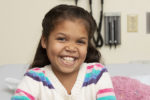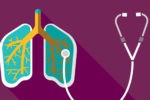The Silent Struggle: Diaper Need and Negative Health Outcomes for Young Children
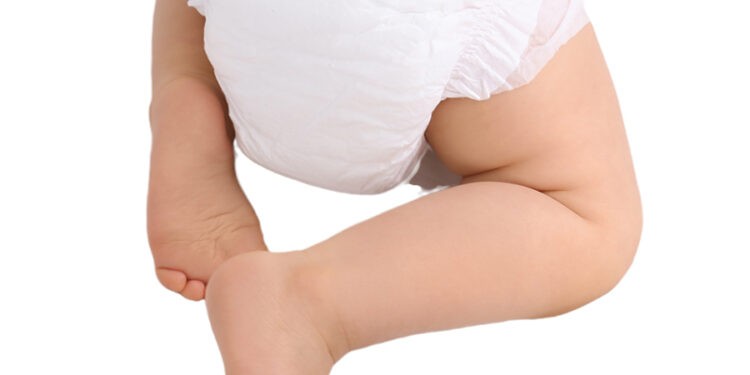
Story by Ashley Allison
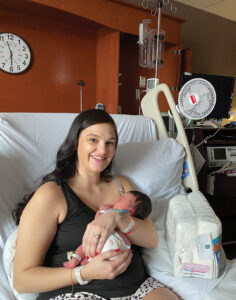 Diapers hold a vital role in ensuring the well-being of young children; diapers are truly a social determinant of health. An often-overlooked issue is noticeably increasing and posing a greater
Diapers hold a vital role in ensuring the well-being of young children; diapers are truly a social determinant of health. An often-overlooked issue is noticeably increasing and posing a greater
threat to children’s health – diaper need. Diaper need is the inability to provide a sufficient amount of diapers to keep a baby clean, dry and healthy. Providing a child with a steady supply
of diapers impacts both their physical and psychological health, as well as the health of their caregivers.
The results of the recently published NDBN Diaper Check 2023: Diaper Insecurity amount U.S. Children and Families reveal the alarming health outcomes associated with an inadequate diaper supply.
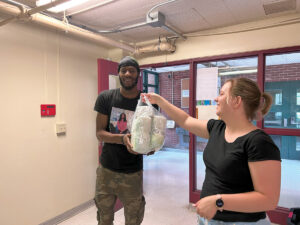 Physical Health Implications of diaper need include skin irritations and infections: without regular diaper changes, the delicate skin of young children is susceptible to irritation, rashes, and infection. Prolonged exposure to moisture, waste, and friction can lead to conditions such as diaper rash, yeast infections, and bacterial dermatitis. These uncomfortable conditions cause pain, discomfort, and, in severe cases, require medical intervention to treat infections caused by an accumulation of bacteria. UTIs can lead to painful urination, fever, and when untreated, cause more severe health complications. Parents who cannot afford the cost of diapers leave them on their children for longer than intended, resulting in nearly 1 million dermatitis pediatric visits per year for children age four and under. Many of these families do not have healthcare coverage, piling onto to the expense of poverty.
Physical Health Implications of diaper need include skin irritations and infections: without regular diaper changes, the delicate skin of young children is susceptible to irritation, rashes, and infection. Prolonged exposure to moisture, waste, and friction can lead to conditions such as diaper rash, yeast infections, and bacterial dermatitis. These uncomfortable conditions cause pain, discomfort, and, in severe cases, require medical intervention to treat infections caused by an accumulation of bacteria. UTIs can lead to painful urination, fever, and when untreated, cause more severe health complications. Parents who cannot afford the cost of diapers leave them on their children for longer than intended, resulting in nearly 1 million dermatitis pediatric visits per year for children age four and under. Many of these families do not have healthcare coverage, piling onto to the expense of poverty.
Wearing soiled diapers for extended periods can also hinder healthy motor and cognitive development. Uncomfortable and soiled diapers may restrict a child’s movement, discourage exploration, and disrupt their ability to focus on developmental tasks. Inadequate diaper changes might inadvertently limit a child’s exposure to positive sensory experiences, potentially impacting their overall growth.
97% of childcare providers in the state of Missouri (2023 Economic Impact Study) require parents to supply diapers, meaning if parents cannot afford them, their child will not be permitted to attend daycare. Early education is vital to short-term and long-term development of children. Students that participate in early childhood education are 2.5 times more likely to go on to higher education. (NDBN)
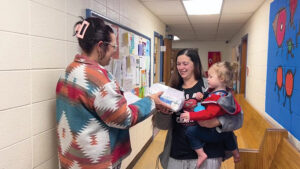 Children whose parents cannot afford diapers do not get quality sleep. (2022 Rutgers School of Nursing study) Children in families that struggled to provide diapers were more likely to have disrupted, shorter sleep periods and lower total sleep scores. Parents who worried about not having enough diapers at least monthly were more likely to report their baby’s sleep as a problem or difficult.
Children whose parents cannot afford diapers do not get quality sleep. (2022 Rutgers School of Nursing study) Children in families that struggled to provide diapers were more likely to have disrupted, shorter sleep periods and lower total sleep scores. Parents who worried about not having enough diapers at least monthly were more likely to report their baby’s sleep as a problem or difficult.
Families who cannot afford a steady supply of diapers often attempt toilet training too early toavoid the cost of diapers. The stress of toilet training at any time can increase the potential for abuse. (HealthyChildren.org/ages-stages/toddler/)
Diapers are a basic item and necessary expense, yet are not covered by government safety net programs like SNAP, WIC or Medicaid. 30% of low-income mothers feel diaper need is even more stressful than food insecurity (PEDIATRICS Journal).
HappyBottoms is Kansas City’s diaper bank and works to fill the diaper need gap to improve the overall wellbeing of children in our community. Founded in 2009 as a grassroots effort to address diaper need, our mission is to collaborate with the community to empower, connect and impact families by alleviating diaper need.
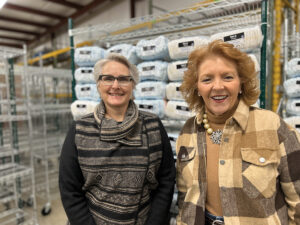 HappyBottoms works with area hospitals, as well as nearly 70 social service agencies to provide families with this basic need. “The best time to address diaper need is in the hospital. Through our Bundles of Joy program, we provide 75 diapers to qualifying families so that they can take their baby home and immediately have what they need to keep them clean, healthy and dry.” Elizabeth Mayer, HappyBottoms Co-Executive Director.
HappyBottoms works with area hospitals, as well as nearly 70 social service agencies to provide families with this basic need. “The best time to address diaper need is in the hospital. Through our Bundles of Joy program, we provide 75 diapers to qualifying families so that they can take their baby home and immediately have what they need to keep them clean, healthy and dry.” Elizabeth Mayer, HappyBottoms Co-Executive Director.
But the help doesn’t stop there. After families settle at home with their newborn, they will have information to find a distribution agency that is convenient for them, where they will be able to receive 50 diapers per month for their child. HappyBottoms distributes diapers through an agency model so that families can not only find a nearby location, but they can also access a myriad of services that might also benefit them. The social service agencies that HappyBottoms partners with offers various resources including medical, housing, food, utility, job training and counseling services.
HappyBottoms has distributed more than 21 million diapers since their founding in 2009. “What we are seeing in need right now is unlike any time in our history. We are distributing 40% more diapers year to date than in 2022. It breaks my heart that so many families are struggling. We’re so thankful for everyone who has supported us so that we can continue to meet the growing need.” Susan Belger Angulo, HappyBottoms Co-Executive Director.
The connection between an insufficient supply of diapers and negative health outcomes for young children is an urgent concern that requires attention from caregivers, communities, and policymakers alike. It’s imperative that we recognize the importance of diaper supply in promoting the health and well-being of our youngest members of society. By raising awareness about this issue, supporting families in need, and promoting responsible diaper usage, we can work together to ensure a healthier and happier start for every child.
To support HappyBottoms in their effort to help families, go to www.happybottoms.org/donate

